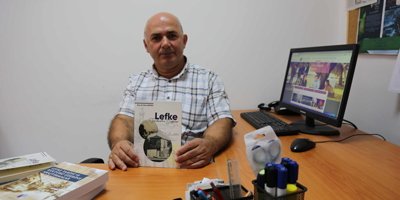A Contribution to the field of Lefke Studies from the Academician of EUL

Ağayev’s book “Pages from the History of Lefke” published
Academician of European University of Lefke Faculty of Arts and Sciences Department of History Assoc. Prof. Dr. Elnur Ağayev’s book titled “Pages from the History of Lefke” has been published. “Pages from the History of Lefke” is the third book of Ağayev who has been producing work about Lefke continuously. This piece which is a follow-up of Ağayev’s previously published books “Good old Lefke” and “Researches on the History and Culture of Lefke”, covers individuals, incidents and places that are located in Lefke.
Ağayev who said that “Every city has a soul and there are elements that serve to create this spirit and keep it alive. These elements are the history, language, art, culture and traditions of the city”, covers the different period of Lefke in her book in order to catch the spirit of the city and to refresh the memories. When some of the subtitles in the book are observed, following headings attract attention; “An Evil Eye to the Lefke Sub-district of 1881 ”, “Establishment of the Municipality of Lefke”, “Şimendüfer Line which is kept away from Lefke ”, “They Hanged Dadlı Dilli Aziz on Tuesday”, “Turkish Flag from Bağlıköy to Korea”,“ İbrahim Zeki Burdurlu and Lefke ” etc…
Ağayev underlined a concern that he had felt while doing a research on Lefke which is a special and local city and states this concern as “When the elements that make up the soul and memory of cities become dull, cities lose their soul, memory and become soulless. You can’t enjoy that city. You cannot understand the bazaars, coffees and streets you visit. You cannot read the history there, you cannot see the art, you cannot experience the culture, you cannot take the traditions. You become a kind of alienation, both to the city and to yourself”. Taking this concern as a point of origin Ağayev sheds a light to the historical background that takes place in the creation of today’s Lefke. In doing so, she used archival documents, oral tradition and historical evidence as sources.
Ağayev stated that he believes that this study, which is based on “a narrative that does not take on scientific sullenness” and is the product of oral, regional and documented historiography ”, will contribute to the field of Lefke research.
